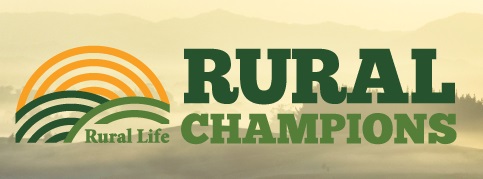
To get to know our finalists a bit better, we've asked each of them three questions on the rural sector and what makes a good community.
Emma Crutchley farms with her husband Kyle Hagen on her family’s sheep and beef farm at Puketoi.
The mother-of-two helped with the relaunch of National Lamb Day in February, alongside her other farming and community duties.

What is your utopian view for the future of the farming sector?
My utopian view would have to be a sector that can see and thrive off economically and environmentally sustainable pathways to continually adapt to a changing world.
As farmers in New Zealand, we run incredibly complex land-based businesses balancing diverse income streams and costs while operating at a strategic, technical and operational level. I am proud to be a farmer. I have aspired to be one since I was a child and I’m exceptionally proud of our sector and the contributions we make.
One aspect I really admire about our sector is the influx of individuals from varied backgrounds, such as hospitality, education, marketing, human resources, healthcare and academia, bringing valuable and transferable skills. This greatly enhances the capabilities we already possess. However, I often hear farmers introduce themselves as just a farmer even just a sheep farmer or a dairy farmer which I think diminishes the wide skill sets we have. It can narrow the identity we hold or even lock our thinking within a particular land use.
By recognising our diverse skills and broader capabilities, we have huge potential to unlock wider pathways for the way in which we sustainably use land and resources, even invest off-farm.
What makes a good rural community?
A thriving community (rural or not) is built on respect and a sense of belonging. For me the word community is a "how are you?". It’s an "are you OK?", a phone call, or a drop-in for coffee, beer or wine. It is where diverse and political views and ideologies can be put aside in favour of commonalities or a shared purpose. It’s the feeling when you want to give back because you’ve already received or know you will.
Communities are not necessarily something you get to choose, nor are they exclusively location-based, especially in a modern world where we are highly connected beyond our geographical area. Broadly, I am lucky to have many communities. All have taught me a lot including the importance of connection from right back at primary and high school, then university and my time living in Wellington. When I returned home, a location-based community including our local group of parents with children who have all played sport together over the years. I’ve also developed wider communities outside my geographical area (but still very rural) through organisations like the Rural Leadership Trust, the Agri-Women’s Development Trust as well as across the wider sector.
A community should never determine an identity where people feel they must fit in, please or conform but should create a space where many identities can co-exist with a feeling of psychological safety. It does not mean everyone should agree, but it needs to create the space where different ideas and opinions can be voiced. While a desire for unity may be strong, it is critical to respect and embrace differences because it is this diversity that brings new ideas and enriches rural life.
Any advice for your younger self?
Several years ago, I was involved in a Regional Plan Change and spoke in Environment Court for the first time. The other witness speakers were a range of talented people from across Otago. I was feeling nervous and out of my depth. The night before I questioned the relevance of me attending to a friend also heavily involved in this space. There were other people going with greater knowledge and experience than me. This friend replied, "they are not you". The meaning here was not that I was any more important, but the worst thing I could do in this situation was assume that someone else would cover off the unique perspective that I could bring.
"They are not you" is a line I repeat to myself any time the good old imposter syndrome kicks in and believe me it still does!
If I could take these learnings back to tell my younger self, I would say, you do you, embrace who you are and don’t compare yourself. There will always be amazing people to look up to but there is already one of them. Trying to fit into what we think the world expects of us, takes away what we can offer the world.
At the centre of all our challenges and opportunities are people: ourselves and how we choose to look at the world, our skills, capability, and diversity we bring to our businesses, communities and our sector. Things are handy, but it will be people that enable the future we need.
— Emma Crutchley, Sheep and beef farmer, Maniototo.










